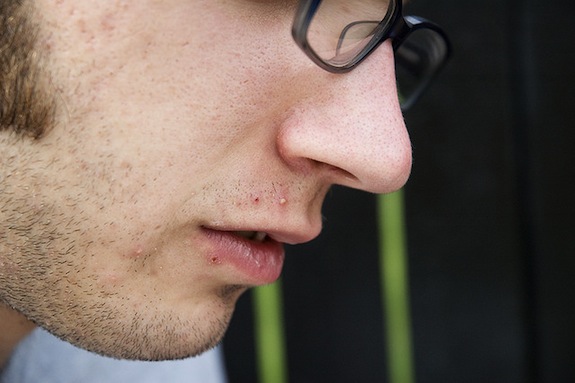Why Do Adults Still Get Pimples?
Here’s how acne really works

Image: stephen
One of the biggest lies of teenager-hood is that when you get older, your acne will go away. The premise is that as a teenager, you’ve got all sorts of weird hormones going on in your body, which makes your skin oily, which causes acne. Once you settle into adulthood, that oil goes away, and your skin clears up.
This is sort of true. But it’s sort of not. Here’s how acne really works.
The first thing to know is that most acne is caused by a bacteria called Propionibacterium (P-bacteria) that lives on everybody’s skin. We all have it, and we always will. P-bacteria lives inside your sweat glands, near your hair follicles and release lipase, an enzyme that digests oil and produces fatty acids. When there’s a lot of oil on your skin, the enzyme goes to town and makes a ton of fatty acids. The body has proteins built in to attack bacteria, called antigens, and when there’s a whole lot of antigens your skin will get inflamed, and your hair follicle there will burst. Tada! Pimple.
Teenagers do tend to have more acne on average because they tend to produce more oil. But adults don’t escape the acne curse, because we still have P-bacteria, that still release lipase, that still produces fatty acids. Today I Found Out explains that something like 20 percent of adults will have facial blemishes their whole life. And adult women are fare more likely to continue getting pimples than adult men—50 percent of women in their twenties report having acne and 25 percent of women in their forties still do.
Basically, you’re bound to have a pimple here and there for the rest of your life. Chances are they’ll show up at key moments, like your wedding day or job interview, but you can at least rest assured that everyone else is still getting pimples, too.
More from Smithsonian.com:
/https://tf-cmsv2-smithsonianmag-media.s3.amazonaws.com/accounts/headshot/Rose-Eveleth-240.jpg)
/https://tf-cmsv2-smithsonianmag-media.s3.amazonaws.com/accounts/headshot/Rose-Eveleth-240.jpg)